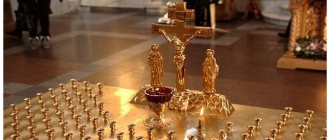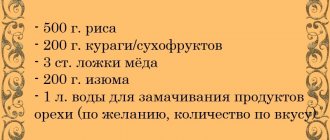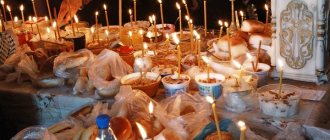The fortieth day after a person’s death has special significance. Orthodox Christians believe that at this time the soul of the deceased comes to the house for the last time to say goodbye to loved ones. After this, she leaves the earth forever and appears before the court of God, where she accounts for her actions. It is at this time that a decision is made about the further fate of the soul of the deceased. A funeral meal is a mandatory ritual held on the fortieth day after the death of a person. According to Orthodox traditions, close relatives, friends and colleagues of the deceased gather at the same table to once again honor the memory of the deceased. In this article we will talk about the features of holding a wake for 40 days and what a sample menu looks like.
What is a wake
When a person dies, loved ones have to deal with many organizational issues. Including how to organize a memorial meal (wake). A wake is a meal at which close people of the deceased gather. They pray for the repose of his soul and, while strengthening their bodily strength, remember the deceased. In the Orthodox tradition, a memorial meal is held on the 3rd, 9th and 40th day after death. The 40th day is especially important. Therefore, the question “what is being prepared for a funeral for 40 days?” is still relevant today.
Funeral table
“40 days after death is a special time when the fate of the soul of the deceased is determined before the Last Judgment. And what this coming eternity will be like for her depends partly on our prayer, love, and mercy. In these days after death, you must pay special attention to all the movements of your soul. Try to abstain not only from sinful acts, but also from evil and dirty thoughts themselves...
On the days of the fortieth day, within 40 days after death, we are no longer responsible only for ourselves. Thus, we are called not to abandon the prayer rule and not to offend anyone. Do not be angry and irritated in secret, do not fall into carnal sins, cheating even in your thoughts. Do not envy, do not boast, do not give your time to idols and idols, be it gadgets, shopping or other temptations. In general, find your own measure for everything, putting service to God and your neighbor at the forefront. And if this failed, do not delay asking forgiveness from the Lord and the people who suffered from us, in order to pray in peace for the deceased” (hieromonk Dimitry (Pershin)).
Why is it necessary to remember the dead?
The Christian understanding of death differs from the atheistic interpretation. Non-believers consider death to be the complete and irrevocable disappearance of a person into “nowhere.” Orthodoxy says that death is the transition of the human soul from the body to Eternity. That is, only the flesh dies, but the soul always remains alive.
“If a person dies, this does not mean that his soul ceases to exist. The body is destroyed, but the soul is immortal. She is alive, although she does not live with us, she lives a different life, just as the saints live a different life” (St. Luke of Crimea).
Where she will end up after death (in heaven or hell) depends not only on how a person spent his earthly life. Although the state of a person’s soul, determined by his earthly path, is most important. Also of great importance is our prayer for the deceased, works of mercy, alms, and a memorial meal. In this way we can implore God for mercy for the deceased. After all, it is in the first 40 days that it is decided where the soul will go after death.
“First of all, we must pray for those departed who in their earthly life saddened God. So that He would have mercy on them too, especially if someone was an evil or cruel person. And if, moreover, his life was sinful, then we must pray a lot for him, order a commemoration at the liturgy, magpies, and give alms to the poor for the repose of his soul, so that, having heard their prayer: “Rest his soul, O Lord,” God had mercy on him. This way we can do for this person what he himself did not do. And a good person, even if his life was not particularly pious, receives great relief from even insignificant prayers for his soul. Because he had an inclination towards goodness” (Reverend Paisiy Svyatogorets).
Pancakes with mineral water
Ingredients:
- 3 glasses of highly carbonated mineral water;
- 3-4 cups flour;
- salt;
- 1.5-2 spoons of granulated sugar;
- 5 tablespoons of vegetable oil.
Preparation
These funeral pancakes (we will look at the recipe with photos of step-by-step preparation) are prepared quite simply. To do this, pour mineral water into a container, add granulated sugar and salt, stir until they are completely dissolved. Gradually add flour, beating the mixture with a mixer at low speed. The dough is brought to a homogeneous state and set aside for half an hour. Next, they begin to bake pancakes in vegetable oil.
How to pray and what to prepare for the 40-day funeral
According to Orthodox Tradition, in the first three days after death the soul has freedom of movement. She can be near the body of the deceased, in the house, or travel to various places. On the third day, the soul leaves the earth and appears before God for the first time. That is why it is customary to perform burials on the third day.
“For for two days the soul, together with the Angels who are with it, is allowed to walk on the earth wherever it wants. Therefore, the soul that loves the body sometimes wanders near the house in which it was separated from the body, sometimes near the coffin in which the body is laid; and thus spends two days like a bird, looking for nests for itself. And a virtuous soul walks through those places in which it used to do the truth. On the third day, He who rose from the dead commands, in imitation of His resurrection, to ascend to heaven for every Christian soul to worship the God of all.” (Venerable Macarius of Alexandria “On the Exodus of the Souls of the Righteous and Sinners”).
Then the deceased begins his journey to God. He sees the heavenly abodes and the abyss of hell. The soul also goes through ordeals - peculiar obstacles caused by its inherent sins and passions. And only after overcoming one ordeal does the deceased move on to the next. On the 9th day, the soul arrives to worship God for the second time. This path lasts until the fortieth day after death. The soul then appears before God. On this day, it is decided where the soul of the deceased will be until the Last Judgment. Only during the Second Coming will the place of her eternal residence be finally determined. That is why prayer for the deceased is so important in the first 40 days. Relatives can, through requests to God and good deeds, “beg” Him for mercy towards the deceased.
On the fortieth day, according to Orthodox tradition, it is customary to attend a service and order a memorial service in the church. It is also necessary to give alms and organize memorial services in memory of the deceased.
Menu forties
As for the question of what the funeral meal should be on the fortieth day, the answer is extremely simple: the funeral table, which is made by the relatives of the deceased on the day of the funeral, is taken as a model. Its mandatory elements must be the following:
- Kutya with honey is a porridge made from wheat grains, pearl barley or barley, which were eventually replaced by rice. When preparing it, you can also use poppy seeds, raisins, nuts, milk, jam, and sometimes bird cherry. Kutya on the funeral table is a symbol of resurrection and the cycle of life, and by eating it, a person, as it were, partakes of this cycle and becomes part of it. Each of its elements not only symbolizes something different, but is also something like a wish for prosperity, sweetness, pleasure and a high harvest. It is allowed to cook both rich kutia, which includes all of the above components, and poor one. There is no single recipe for kutya; all recipes are similar to each other, but at the same time they differ depending on the regions.
- meat broth with meatballs, noodle soup or borscht - again, depending on where you live.
- rich (or lean) pancakes. The fundamental difference between them is that lean pancakes are made not with milk, but with water.
- potatoes with meat, usually stewed or mashed, served as a side dish. If desired, this dish can be replaced with buckwheat porridge.
- cutlets or chicken.
- some fish dish, usually fried fish.
- dried fruit compote or jelly.
Optional elements of the fortieth day menu, which can be prepared at will and if possible, are:
- pies with rice, mushrooms or cottage cheese or pies with potatoes and sour cream (lately this element has become a regular feature).
- sliced cheese or sausage (except during fasting, when these products are prohibited).
- one or two salads from fresh vegetables.
- the deceased's favorite dish. However, if it is too difficult to prepare or exotic - for example, foie gras with white wine - then it is better not to cook it. Folk tradition calls for modesty, and the Orthodox Church completely agrees with it on this.
- the vinaigrette.
- Olivie.
- various snacks and salads.
- various pickles.
They also prepare special memorial bags with sweets (sweets and cookies), which are given to each departing guest after the end of the meal. Following folk tradition, it is imperative to ensure that there is an even number of sweets and cookies in these bags. You can complement this sweet memorial set with a Lenten bun.
Usually, relatives and closest friends of the deceased are invited to fortieth celebrations, and ideally, everyone who treated him well. At the same time, it doesn’t hurt to approach the organization of a wake rationally and figure out how many people can be treated to a funeral dinner without unduly burdening the family budget (alas, no one has canceled the harsh reality, not even God’s representatives on this sinful earth). The same applies not only to the number of guests, but also to the formation of the menu: you should not amaze the guests with the abundance and variety of treats. If the wake falls on days of fasting, then it goes without saying that there should be no meat dishes on the funeral menu. In this case, the borscht can be cooked lean, replacing the meat with beans or mushrooms, and it would be appropriate to replace the mashed potatoes with buckwheat porridge, which we have already mentioned. The same applies to pancakes: taking into account the obligatory nature of this symbolic dish on the funeral table, priests recommend making them not fast, but fast. It is also advisable not to hold funeral services on weekdays of Lent, but to move them forward to the next weekend. If the fortieth day falls on Easter or on any day of the Easter week, then it is best to move it a week ahead, to the beginning of Radonitsa. It is recommended to do the same if this day falls on Christmas: move it a week ahead, after consulting with the priest.
Visiting a temple during days of mourning
The extent to which prayer for the dead is necessary during the Divine Liturgy can be judged from several cases. When Theodosius of Chernigov was not glorified as a saint, Elder Alexy dozed off at the relics. During his sleep, the Saint appeared to him. He asked the elder to remember the saint’s parents during the Liturgy. And he called them by name (Nikita and Maria).
“How can you, saint, ask for my prayers, when you yourself stand before the Heavenly Throne and give people God’s grace?” – Hieromonk Alexy asked.
“Yes, this is true,” answered Saint Theodosius, “but the offering at the Liturgy is stronger than my prayers.”
This is how important it is to pray for the repose of the soul in church during the Liturgy.
Saint Gregory the Great answers, “is there anything that could be useful to souls after death”:
“The holy sacrifice of Christ, our saving Sacrifice, is of great benefit to souls even after death, provided that their sins can be forgiven in the hereafter. Therefore, the souls of the departed sometimes ask that the Liturgy be served for them... Naturally, it is safer to do for ourselves during our lifetime what we hope others will do for us after death. It is better to exodus free than to seek freedom while being in chains. Therefore we must despise this world with all our hearts, as if its glory had passed away, and daily offer to God the sacrifice of our tears as we offer up His sacred Flesh and Blood. Only this sacrifice has the power to save the soul from eternal death, for it mysteriously represents to us the death of the Only Begotten Son” (IV; 57, 60).
What a wake shouldn't be
Even among believers, the funeral meal is often replaced by an ordinary feast, and sometimes by drinking. Relatives who have not seen each other for a long time gather around the table. They spend time in momentary conversations, forgetting about the spiritual meaning of the wake, about prayer for the deceased. For them, the problem of preparing for a funeral for 40 days obscures the memory of the deceased.
What exactly should you not do on the 40th day?
It is not blessed to serve a large amount of alcoholic drinks, with the exception of a little Cahors. Since a funeral meal is not a feast or a feast.
Anatoly Strakhov, rector of St. Nicholas Church at the Elshansky cemetery in Saratov, speaks about alcohol at funerals:
“This is something that you not only have to face, but also fight. It is even necessary to prohibit this kind of commemoration as having nothing in common with Christianity. The deceased, first of all, need our prayers and good deeds performed in memory of him. The funeral service in the church testifies that the person died in peace with the Church, and the Church prays for him, for the forgiveness of his sins. And the funeral meal represents a good deed aimed at those who live nearby. Usually people close and acquaintances were invited to it, as well as poor people, beggars, who, having attended the dinner, could offer a prayer for the soul of the deceased.”
Time should not be wasted on preparing food at the expense of worship and prayer. The main idea should not be that they prepare for the funeral for 40 days. A wake that turns into a noisy feast or drinking session will not bring any benefit to the soul of the deceased.
“Unfortunately, along with the general culture, the culture of funeral meals, which were originally a continuation of the funeral church service, has also gone into oblivion. But, despite this, every effort must be made to ensure that the funeral dinner is accompanied by an atmosphere of reverence and silence, and not by the desire to observe the most obscure signs” (hieromonk Dorofei (Baranov)).
Recipes: how to bake rich pancakes?
Popular option with milk
For pancakes with milk you need:
wheat flour – 250 g;- yeast – 25 g;
- cow's milk – 1 liter;
- butter – 40 g;
- salt - a pinch;
- sugar – 3 tbsp. l.;
- eggs – 2 pcs.;
- vegetable oil – 3 tbsp. l.;
- soda – ½ tsp.
Cooking steps:
- Place the milk on the stove to warm up.
- Grind eggs with sugar. Add salt, oil. Mix well.
- Pour 1 cup of warm milk into the bowl with the mixture. Add soda.
- Pour the sifted flour into a bowl. Mix well so that there are no lumps. Pour in the rest of the milk and bring the mixture until smooth.
- Fry the pancakes for 30 seconds on each side in a preheated frying pan greased with vegetable oil.
We invite you to watch a video on how to cook pancakes with milk:
Rye
What do these pancakes symbolize? The combination of rye flour and cream present in the recipe symbolizes deep respect for the person for whose memory we gathered. For preparation you need the following ingredients :
rye flour – 350 g;- water – 0.5 liters;
- yeast – 25 g;
- cream – 100 g;
- extra salt - a pinch;
- sugar - to taste.
Stages of preparing pancakes:
- Dissolve yeast in warm water.
- Combine all ingredients in a dough container. Mix the dough until a homogeneous consistency is obtained.
- Let the dough stand until it rises fully and fry, trying to gather the dough without stirring.
What is prepared for the 40 day funeral?
The funeral dinner for 40 days begins with the serving of kutia (kolivo) consecrated in the temple. These are boiled grains of wheat, sometimes rice, seasoned with honey. Wheat commemorates the resurrection of the deceased: falling into the ground, it eventually turns into a plant. Likewise, the deceased, being buried in accordance with church customs, is resurrected to eternal life. Honey is a symbol of eternal bliss in the Heavenly Kingdom. Traditionally, pancakes and sweet jelly are served.
On fasting days, the food on the table should also be lean.
Different regions have their own characteristics in organizing funerals. In many places, for 40 days, there was a glass of water and bread or pancake on the window or in the red corner. In the Smolensk region there was a pious tradition on the eve of the fortieth day to perform a special funeral prayer rule, prayers were read, psalms were sung. In the morning, relatives went to the cemetery and ended the day with a meal.
In the southern regions, “ladders” (a flour product in the shape of a ladder) were baked for funerals as a symbol of ascent to Heaven. In Ryazan, a table was set at the gate of the house, jelly and honey diluted in water were placed, and spoons were left. Everyone could come up, taste the treat, remember the deceased and take the spoon with them.
Lenten pancakes with milk
Ingredients:
- 5 glasses of low-fat milk;
- 3.5 cups flour;
- 10 grams of dry yeast;
- 5 grams of salt.
Preparation
According to this recipe, funeral pancakes can be prepared from wheat, buckwheat or oatmeal. They can also be mixed in equal proportions. To do this, dilute yeast in a glass of milk in a bowl and set aside for ten minutes. Then add the rest of the milk and two cups of flour. The ingredients are mixed, covered with a towel and placed in a warm place for the dough to rise, and it should double in volume. Then add flour, add salt and make a dough, then put it in a warm place again. Funeral pancakes, the recipe for which we are considering, are baked in vegetable oil. To do this, scoop out the dough with a spoon and place it on a hot frying pan.
How to conduct a wake correctly - opinions and advice from priests
Archpriest Sergius Vasin advises:
“For a deceased person, the 40th day after death is one of the most important in his life. It is clear that our time and eternity, in which time does not exist, are increasingly a convention. Nevertheless, the Lord determined for us in this way that, based on our time, while here on earth, we pray especially for the newly deceased. This is important because the preliminary fate of the deceased is decided, a preliminary judgment of the soul begins. Therefore, it is imperative to pray intensely for this soul for 40 days. And remember her on the 9th day, when the soul leaves the heavenly abodes and hell is shown to it. Especially pray before the 40th day: you definitely need to order a mass (when a particle for this person is immersed in the blood of Christ with prayer, to wash away the sins of this person) and a memorial service in the church - this is the most important thing.
The meal is still secondary. It matters, but in its modern form, of course, it has completely lost its main purpose. So the question of what is prepared for the funeral for 40 days is not fundamental. Initially, a funeral meal is a sacrifice to God for a person’s soul, when they try to feed needy, hungry people, increase love in this world and share love with the newly deceased. This is how it should be, for real.”
Archpriest Andrei Efanov reminds:
“The most important thing on the 40th day is to pray for the deceased person. As for the dinner that is prepared for the funeral for 40 days, it does not have any sacred meaning. Essentially, it's just a meal to energize family and friends. They gather primarily to pray together. And then they have lunch, because without food it’s difficult for a person. And since this is the last day, lunch should be lean, that is, without animal products. To put it simply, during Lent we eat vegetables and fruits.”
For a funeral dinner you need to prepare dishes with eggs and herbs
It is imperative to eat dishes with the addition of eggs - a symbol of the eternity of the soul, because Mary Magdalene announced the Resurrection of Christ to Emperor Tiberius, presenting him with an egg as a gift and it turned red. They can be crumbled into salads or added to pie or pancake fillings.
You can make pies or nalistniki with green onions and a boiled egg, since the green color and herbs symbolize life. Therefore, in a cemetery it is customary to plant flowers on the grave, and also bring them to the deceased each time, and at funerals they usually use a lot of flowers.
Subject:
- wake
Prayers before and after 40 days
Psalm 90
Living in the help of the Most High, he will settle in the shelter of the Heavenly God. Says the Lord: Thou art my Protector and my Refuge. My God, and I trust in Him. For He will deliver you from the snare of the trap, and from rebellious words, His splash will overshadow you, and under His wing you hope: His truth will surround you with weapons. Do not be afraid from the fear of the night, from the arrow that flies during the day, from the thing that passes in darkness, from the cloak, and from the demon of the midday. Thousands will fall from your country, and darkness will fall at your right hand, but it will not come close to you, otherwise you will look at your eyes, and you will see the reward of sinners.
For You, O Lord, are my hope, You have made the Most High your refuge. Evil will not come to you, and wound will not approach your body, as His Angel commanded you to keep you in all your ways. They will lift you up in their arms, but not when you dash your foot on a stone, step on an asp and a basilisk, and cross a lion and a serpent. For I have trusted in Me, and I will deliver, and I will cover, and because I have known My name. He will call to Me, and I will hear him: I am with him in sorrow, I will overcome him, and I will glorify him, I will fill him with long days, and I will show him My salvation.
Prayer for the deceased 1st
Rest in peace, Lord, the souls of your departed servants: my parents, relatives, benefactors (names), and all Orthodox Christians, and forgive them all sins, voluntary and involuntary, and grant them the Kingdom of Heaven.
Prayer for the deceased 2nd
Remember, O Lord our God, in faith and hope the life of your eternal newly departed servant (your servant), (name), and as he is good and a lover of mankind, forgiving sins and consuming iniquities, weaken, forsake and forgive all his voluntary and involuntary sins, exonerating him at Thy holy second coming into the communion of Thy eternal blessings, for the sake of the One who has faith in Thee, the true God and Lover of mankind. For You are the resurrection and the life and the rest of Your servant, named Christ our God. And we send glory to You, with Your beginningless Father and with the Most Holy Spirit, now and ever and unto ages of ages, Amen.
Read us conveniently on social networks:
Tags: menu for 40 days of commemoration at home, funeral dinner for 40 days menu, what is prepared for 40 days, what is prepared for the funeral of 40 days











